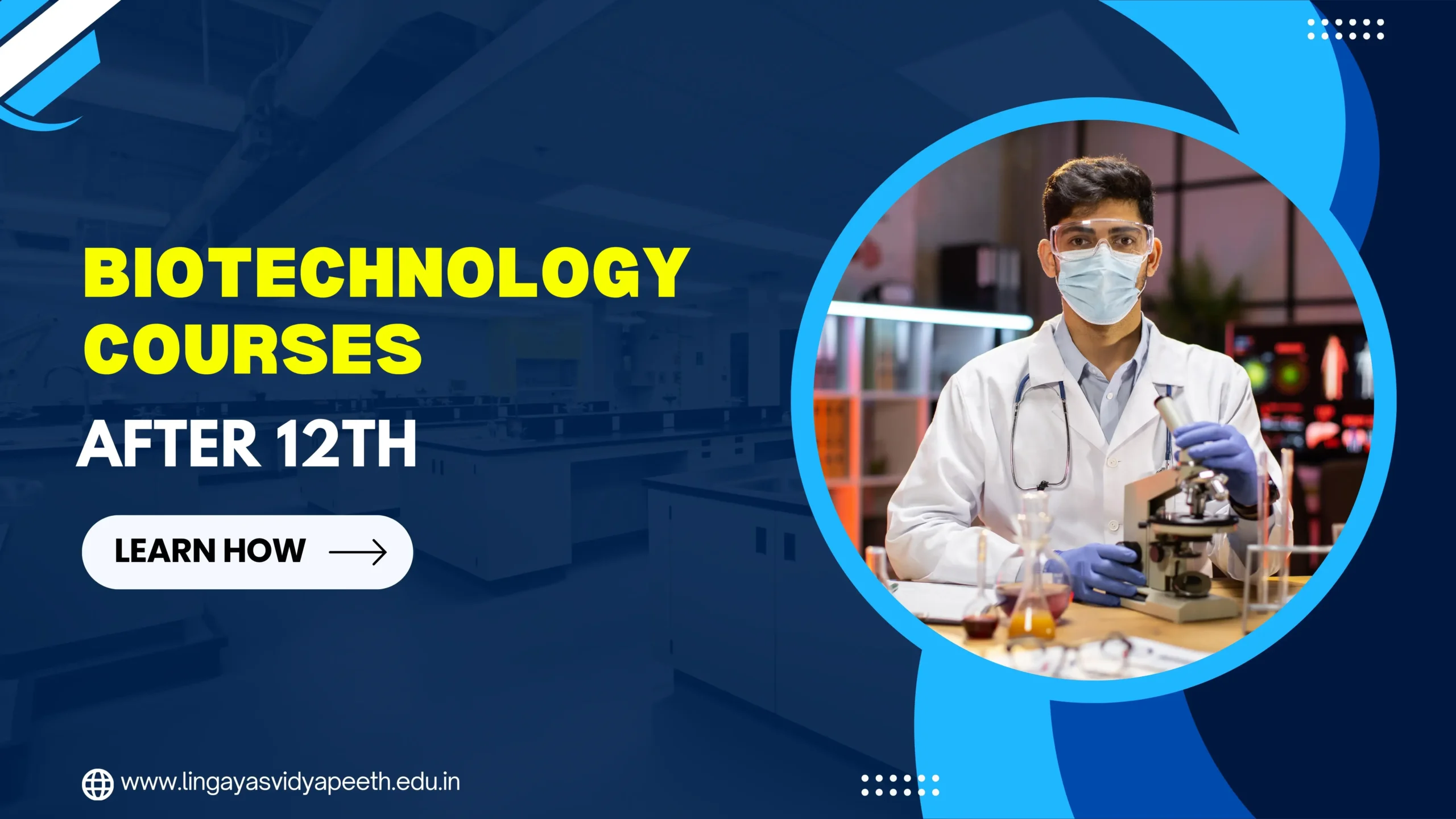Home » Biotechnology Courses After 12th: Know the Eligibility

Students who have completed their 12th grade with an interest in biology may find biotechnology courses after 12th to be a valuable and future-focused choice. Biotechnology uses biology and technology to fix real problems – like creating new medicines, growing better plants or cleaning up nature. At Lingayas Vidyapeeth, we’re here to share practical information to help you learn about it more better.
This blog post covers everything you need: course options, eligibility, application steps, and career paths—all rooted in our expertise in Basic & Applied Sciences.
The biotech world is expanding fast. A 2030 projection from Grand View Research estimates the global biotechnology market will reach $1.68 trillion, growing at 8.7% annually. That’s a lot of jobs and innovations ahead. With the right course now, you could be part of it. Let’s break it down so you can choose wisely.
Biotechnology courses after 12th teach you how to apply biological systems—such as cells and microorganisms—to develop useful products. Here are the main options:
At Lingayas Vidyapeeth, our BSc Biotechnology course, for instance, covers microbiology, genetics, and bioinformatics. You’ll spend time in labs growing bacteria or testing enzymes—not just reading books. We focus on skills that companies need, so you’re ready to work or study further.
So, why biotechnology? For one, it matters. It’s behind breakthroughs like insulin for diabetes or drought-resistant crops. Plus, it’s a smart career move. India’s biotech sector could hit $300 billion by 2030, according to the India Brand Equity Foundation (IBEF), meaning more opportunities every year.
A career in biotechnology after 12th could take you places. You might research new drugs, improve food safety, or even fight climate change. At Lingayas, our students have gone on to roles in top firms because they started with a strong base. The field’s variety and impact make it worth considering.
Let’s talk about biotechnology course eligibility.
No biology background? Some diplomas might still work if you’re eager to learn. Contact us at Lingayas to see what fits your situation.
A common question which students always ask is How to apply for a Biotechnology course after 12th?
Last year, a student with 58% in PCB applied to our BSc program online. She got in based on merit and started classes soon after. It’s that easy with us.
If BSc biotechnology courses after 12th sound appealing, here’s the scoop. It’s a 3-year degree that’s practical and versatile. At Lingayas, you’ll study:
Jobs love BSc grads. McKinsey predicts a 15% rise in roles like lab technicians by 2030. Our students often start at ₹3-5 lakhs per year, and that grows with time.
About biotechnology course details? You’ll pick up these skills that matter:
At Lingayas, we go beyond books. Our BTech students, for example, build mini bioreactors to grow cells for products like biofuels.
A career in biotechnology after 12th offers variety. Here’s what you could do:
Our grads work at places like Biocon because we offer internships and guidance. It’s not just a degree—it’s a launchpad.
Lingayas Vidyapeeth has a solid reputation in Basic & Applied Sciences. Our faculty—many with PhDs—have tackled projects like bio-based fertilizers. Our labs feature tools like PCR machines, so you train on pro-level equipment. Plus, industry ties mean internships that boost your resume. We succeed when you do—our goal is to guide you and help to achieve your goals too.
To pursue B.Sc. Biotechnology after 12th, you usually need PCB—either Biology or Maths. For B.Tech, the requirements may vary, but don’t worry—we have something for everyone.
The cost of our B.Sc. course depends on your admission timing—and it’s more affordable than many private colleges. Reach out to us for exact figures!
It takes effort; however, if you enjoy science, it’s fun. We offer practical classes and provide full support.
Biotechnology courses after 12th open doors to a field that’s growing fast—$1.68 trillion globally by 2030, according to Grand View Research. At Lingayas Vidyapeeth, we offer clear bio technology course details, real lab experience, and a focus on your future. You can apply for the B.Sc. Biotechnology course at Lingaya’s University.
Also Read
High salary courses after 12th Arts stream
Computer science courses after 12th
High salary courses after 12th Humanities
Business courses after 12th
High Salary Courses After 12th Science
From
Lingaya’s Vidyapeeth
Best Colleges in Delhi NCR
RECENT POSTS
CATEGORIES
TAGS
Agriculture Agriculture future AI Architecture artificial intelligence BA English BA Psychology BTech CSE BTech Engineering Business management career Career-Specific Education career guide Career Opportunities career option career scope Civil engineering commerce and management Computer Science Computer science engineering Data science degree education Engineering Engineering students English Literature english program Exam tips Fashion Design Fashion design course Higher Education Journalism journalism and mass communication law Law career Machine Learning MA Psychology Master degree mathematics MBA Mechanical Engineering Pharmacy Psychology Research and Development students
University Address: Nachauli, Jasana Road, Faridabad, Haryana
Toll Free: 1800-120-4613
Mobile : 8447744303 | 8447744304 | 8447744306 | 8447744309
Address: C-72, Second Floor, Shivalik, Near Malviya Nagar,
Above HDFC Bank, New Delhi 110017
Ph.No. - 011-46570515 / 45138169 / 41755703 / +91-7303152412
Jagmani Kutir, Ground Floor, Road No-1, Rajeev Nagar,
Near Darbar Marriage Hall, Patna-800024, Bihar
Contact No: 9818352069/8130120095
Mail: [email protected]
Copyrights © 1998 - 2025 Lingaya's Vidyapeeth (Deemed To Be University). All rights reserved.
It is important to note that the following email IDs and domains are fraudulent and do not belong to our university.
LV only conducts physical/online verification of any document related to examination on the following email id: